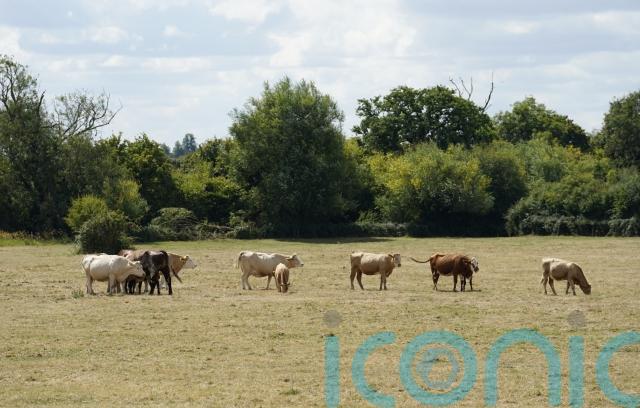
Chancellor Rachel Reeves is facing fresh pressure from farmers to axe plans to introduce inheritance tax on farming land and businesses.
Ahead of the Budget next week, the National Farmers’ Union (NFU) said Ms Reeves “cannot keep taxing businesses into the ground”.
The union said the Government must acknowledge the volatile nature of farm business income and provide greater stability as it criticised policies Labour has introduced.

The Chancellor’s plans to introduce a 20% rate on agricultural land and businesses worth more than £1 million have become a political flashpoint for a sector struggling with rising costs, tough market conditions and worsening climate impacts.
NFU president Tom Bradshaw warned that family farms across the UK are halting investment or anticipating having to sell parts or all of their farm to pay an inheritance tax bill.
Some horticultural businesses have also seen employment costs increase by hundreds of thousands of pounds after Ms Reeves hiked employer national insurance contributions in last year’s budget, Mr Bradshaw warned.
The NFU also highlighted how farming incomes can vary year-to-year because of impacts such as climate change and changing global markets, making planning and investment difficult.
Mr Bradshaw said the impact of volatility is “written large” in recent Environment Department (Defra) farm business income figures, compiled between March 2024 and February 2025.
Following Defra’s latest set of Farm Business Income figures, NFU President Tom Bradshaw talks about the volatile nature of farm business income, and urges the government to provide greater stability in the upcoming Budget.
Read more 👉 https://t.co/UrTLApw23E pic.twitter.com/GovKJ7tJtb
— National Farmers' Union (@NFUtweets) November 21, 2025
The data shows an increase in income for most sectors except horticulture and specialist pig production – although it does not cover the challenging 2025 harvest or the impact of the summer’s drought on areas such as animal feed costs.
It follows a longer-term trend of variation, where some sectors have seen peaks in income being immediately followed by major falls, such as the arable sector, which had a strong period between 2021 and 2023 only then to see income plummet by 73%.
The NFU said that while the figures indicate some recovery, this month farmgate milk prices have once again fallen by as much as six pence per litre.
“The farming sector has always had to deal with elements beyond our control which impact what we earn – from increasingly extreme weather to changing global markets,” Mr Bradshaw said.
“While farmers understand that our income will vary year-to-year, it doesn’t seem like the Government does.
“Nor does it seem to recognise its role in minimising volatility at home where possible.
“If the Government truly believes in growth, it cannot keep taxing businesses into the ground.”
Mr Bradshaw said the Chancellor has the chance “to do right by Britain’s farmers and rethink the family farm tax” at the Budget on Wednesday.
He also said the Treasury can incentivise investment and support business planning through increasing the annual investment allowance and introduce enhanced capital allowances.
“These would not only send a clear signal that our Government understands how agriculture businesses work, but that greater stability is needed to build resilience, boost confidence and invest in the future of homegrown food,” he said.

It comes after the new Country Land and Business Association (CLA) president launched a blistering attack on Labour’s rural economic policies in front of Environment Secretary Emma Reynolds at a conference on Thursday.
Gavin Lane told Ms Reynolds that the rural economy faces a lack of investment, certainty for planning and higher unemployment, while many people in the countryside feel forgotten about or not listened to by the Government.
“Well I’m sorry if that’s the way you feel,” she said, adding that environment ministers “really appreciate your engagement” and that she is “optimistic about the future”.
During her speech, the Environment Secretary said she “listened carefully” to the CLA president’s comments.
But rather than expanding on the inheritance tax debate, she sought to “focus on the future”, outlining how the Environment Department (Defra) plans to work alongside rural businesses as well as across Government to address the challenges it faces.
Asked about reports last month that the policy could be softened at the upcoming Budget next week, Mr Lane later told reporters: “Everything we’ve been told has been that the door is shut now and that there’s going to be no movement.”
Farming minister Angela Eagle said: “We’re backing British farmers to create a profitable and sustainable future for farming, alongside major investment in innovation and technology to improve productivity and resilience.
“We are also working across the food supply chain to help ensure farmers get a fair return for the high-quality food they produce.”
Subscribe or register today to discover more from DonegalLive.ie
Buy the e-paper of the Donegal Democrat, Donegal People's Press, Donegal Post and Inish Times here for instant access to Donegal's premier news titles.
Keep up with the latest news from Donegal with our daily newsletter featuring the most important stories of the day delivered to your inbox every evening at 5pm.